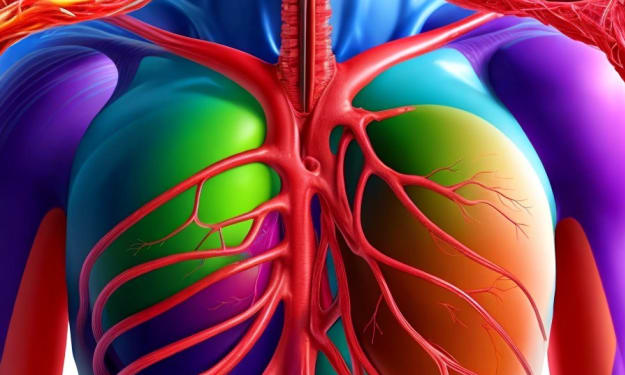The Symphony of Sustenance: Unveiling the Wonders of Your Digestive System
From Bite to Elimination: How Your Body Breaks Down Food for Optimal Health

The Symphony of Sustenance: Unveiling the Wonders of Your Digestive System
Our bodies are complex machines, fueled by the intricate dance of various systems working in harmony. Among these, the digestive system plays a vital role – transforming the food we consume into the nutrients our bodies need to thrive. This remarkable system, often taken for granted until discomfort arises, deserves closer examination. Let's embark on a journey through the digestive system, exploring its fascinating processes and the crucial role it plays in maintaining our health.
Breaking Down the Basics: The Digestive Journey
Digestion simply refers to the breakdown of food into its most basic components, allowing our bodies to absorb essential nutrients. This intricate process involves a remarkable collaboration between several organs and powerful chemicals:
- The Mouth: It all starts here. Chewing breaks down food into smaller pieces, while enzymes in saliva begin the initial stages of digestion by breaking down carbohydrates.
- The Esophagus: Acting as a muscular tube, the esophagus propels the chewed food, now a bolus, down to the stomach.
- The Stomach: This muscular sac acts as a churning vat. Powerful stomach acids and enzymes further break down food into a liquid mixture called chyme, facilitating nutrient absorption in the small intestine. Additionally, stomach acid plays a defensive role, creating an environment that discourages the growth of harmful bacteria.
A Microbiome Marvel: The Gut and its Tiny Tenants
Recent research sheds light on the significance of the gut microbiome, a diverse community of microorganisms residing in our digestive tract. These "good" bacteria play a crucial role in digestion, aiding nutrient absorption, immune system function, and even mood regulation. Maintaining a healthy gut microbiome is essential for overall well-being.
The Powerhouse of Absorption: The Small Intestine
The small intestine, aptly named for its size and critical function, is where the magic of nutrient absorption happens. Chyme from the stomach enters the small intestine, where powerful enzymes from the pancreas and bile from the liver further break down proteins, fats, and carbohydrates. The small intestine's extensive surface area, aided by finger-like projections called villi, maximizes nutrient absorption into the bloodstream for transport throughout the body.
Waste Management: The Large Intestine
The large intestine, also known as the colon, plays a crucial role in waste elimination. Here, water is absorbed from the remaining food residue, solidifying it into stool. When this process is disrupted, it can lead to conditions like diarrhea, where excessive water remains in the stool.
The Supporting Cast: Essential Partners in Digestion
Several other organs play vital roles in the digestive symphony:
- Pancreas: This gland releases digestive enzymes that break down proteins, carbohydrates, and fats.
- Liver: This multifunctional organ produces bile, a substance that aids in fat digestion. The liver also plays a role in detoxification and blood sugar regulation.
- Gallbladder: This sac stores bile produced by the liver and releases it into the small intestine when needed for fat digestion.
Maintaining Digestive Harmony: Tips for a Healthy Gut
Disruptions in the digestive system can manifest as symptoms like nausea, vomiting, diarrhea, or constipation. While generally not life-threatening, they indicate the body's struggle to extract nutrients from food. Here are some tips to promote a healthy digestive system:
- Embrace a Balanced Diet: Prioritize whole grains, fruits, vegetables, and lean protein sources. Limit processed foods, saturated and trans fats, and added sugar, which can disrupt gut health.
- Stay Hydrated: Adequate water intake is crucial for proper digestion and preventing constipation.
- Manage Stress: Chronic stress can negatively impact gut health. Practice relaxation techniques like yoga or meditation to manage stress levels.
- Incorporate Probiotics: Consider incorporating probiotic-rich foods like yogurt or kimchi into your diet. Probiotics can help maintain a healthy balance of gut bacteria.
- Listen to Your Body: Pay attention to how different foods affect your digestion. If you experience persistent digestive issues, consult a doctor to rule out any underlying conditions.
Addressing Digestive Discomforts: Common Issues and Solutions
The digestive system, while remarkably efficient, can sometimes experience challenges. Here's a look at two prevalent conditions and some potential solutions:
- Irritable Bowel Syndrome (IBS): IBS is a chronic condition characterized by abdominal pain, cramping, bloating, diarrhea, or constipation. While the exact cause remains unknown, factors like stress, gut microbiota imbalances, and food sensitivities are believed to play a role. Management strategies for IBS often focus on:
- Dietary Modifications: Identifying and avoiding trigger foods like dairy products, gluten, or high-FODMAP foods can significantly reduce symptoms.
- Stress Management: Techniques like yoga, meditation, or deep breathing can help manage stress and reduce IBS flare-ups.
- Fiber Supplementation: Increasing fiber intake through psyllium husk or other soluble fiber sources can promote regularity and alleviate constipation. It's important to consult with a doctor before starting any new supplements, especially if you have any existing health conditions.
- Lactose Intolerance: This condition arises due to a deficiency of the enzyme lactase, which is necessary for breaking down lactose, the sugar found in milk and dairy products. Lactose intolerance symptoms include bloating, gas, abdominal cramps, and diarrhea after consuming dairy products. Management options for lactose intolerance focus on:
- Dietary Adjustments: Limiting or avoiding dairy products is the primary strategy. Many lactose-free dairy alternatives like milk, cheese, and yogurt are readily available.
- Lactase Enzyme Supplements: Taking lactase enzyme tablets before consuming dairy products can help with lactose digestion and minimize symptoms.
By understanding these common digestive issues and exploring potential solutions, we can take charge of our gut health and promote a more comfortable and balanced digestive system.
Conclusion: A Symphony for Life
The human digestive system is a marvel of biological engineering, a complex yet efficient network that transforms food into the building blocks of life. Understanding this remarkable system empowers us to make informed choices about our diet and lifestyle, promoting optimal digestion and overall well-being. By nurturing the delicate balance within our digestive tract, we can ensure a healthy and vibrant symphony of life within us.
About the Creator
suren arju
Hi there! I'm Suren, your startup guide. Entrepreneur, writer, dreamer - I share insights, tips & stories to fuel your startup journey. Ready to explore, learn & win together? Join me & let's redefine how we launch, learn & leap!
Enjoyed the story? Support the Creator.
Subscribe for free to receive all their stories in your feed. You could also pledge your support or give them a one-off tip, letting them know you appreciate their work.





Comments
There are no comments for this story
Be the first to respond and start the conversation.